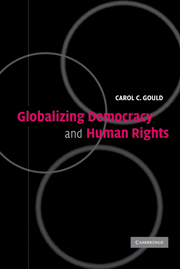Book contents
- Frontmatter
- Contents
- Acknowledgments
- Introduction: Between the Personal and the Global
- PART I THEORETICAL CONSIDERATIONS
- PART II DEMOCRACY AND RIGHTS, PERSONALIZED AND PLURALIZED
- PART III GLOBALIZING DEMOCRACY IN A HUMAN RIGHTS FRAMEWORK
- 7 Evaluating the Claims for Global Democracy
- 8 Are Democracy and Human Rights Compatible in the Context of Globalization?
- 9 The Global Democratic Deficit and Economic Human Rights
- PART IV CURRENT APPLICATIONS
- Index
7 - Evaluating the Claims for Global Democracy
Published online by Cambridge University Press: 23 November 2009
- Frontmatter
- Contents
- Acknowledgments
- Introduction: Between the Personal and the Global
- PART I THEORETICAL CONSIDERATIONS
- PART II DEMOCRACY AND RIGHTS, PERSONALIZED AND PLURALIZED
- PART III GLOBALIZING DEMOCRACY IN A HUMAN RIGHTS FRAMEWORK
- 7 Evaluating the Claims for Global Democracy
- 8 Are Democracy and Human Rights Compatible in the Context of Globalization?
- 9 The Global Democratic Deficit and Economic Human Rights
- PART IV CURRENT APPLICATIONS
- Index
Summary
We are now in a position to consider the issue of globalizing democracy, which is adumbrated at the practical level in the emergence of regional political bodies, such as the European Union and smaller-scale crossborder democratic communities of various sorts, and envisioned at the theoretical level in the very general normative requirement for democratic decision making presented in this work and in that of other democratic theorists. However, when we take democracy so generally it is clear that new issues come to the fore, especially questions of the proper scope and extent of a viable democratic community. We can thus be led to ask, is this globalization of democracy really a helpful direction for democratic theory? What does it entail specifically about who participates in which decisions? What in fact do political philosophers mean when they speak of global or cosmopolitan democracy, as they are increasingly doing?
In this chapter, I begin with a brief sketch of some of the key features of contemporary globalization in their import for democracy and then assess the main models that have been advanced for global or cosmopolitan democracy, notably those put forth by David Held, Daniele Archibugi, Richard Falk, and Thomas Pogge. Given the somewhat schematic nature of these theories, however, I move back to a more elemental approach and take up the question of how to formulate the proper scope of democratic decision making – that is, who has a right to decide about a given issue?
- Type
- Chapter
- Information
- Globalizing Democracy and Human Rights , pp. 159 - 182Publisher: Cambridge University PressPrint publication year: 2004



